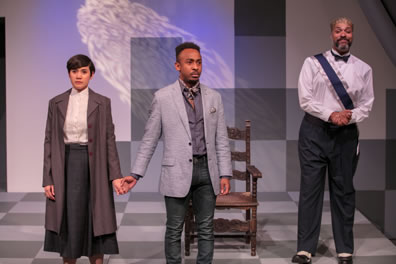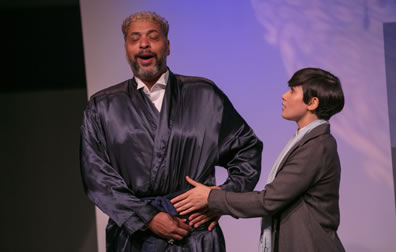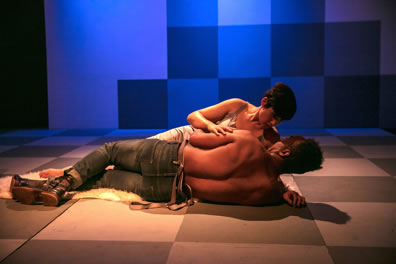All's Well That Ends Well
All's Well That Starts Well
Independent Shakespeare Company, Independent Studio, Atwater Crossing Arts and Innovation Complex, Los Angeles, California
Saturday, March 24, 2018, Third row, center of 60-seat studio theater.
Directed by Melissa Chalsma

Helena (April Fritz) is married to an unwilling Bertram (Evan Lewis Smith) as a delighted King (René Thornton Jr) looks on in Independent Shakespeare Company's production of William Shakespeare's All's Well That Ends Well, which opened the company's new studio theater. Photo by Grettel Cortes Photography, Independent Shakespeare Company.
Theatre for a New Audience opened its new theater, the Polonsky Shakespeare Center in Brooklyn, New York, in 2013 with William Shakespeare's A Midsummer Night's Dream. The next year, Chesapeake Shakespeare Company opened its new downtown Baltimore, Maryland, theater with Shakespeare's A Midsummer Night's Dream. Cincinnati Shakespeare Company last year opened its new Otto M. Budig Theater in downtown Cincinnati, Ohio, with Shakespeare's A Midsummer Night's Dream. Inaugurating a Shakespeare theater with his play about dreams, fairy magic, and theater seems patently obvious.
Not to Melissa Chalsma, cofounder and artistic director of the Independent Shakespeare Company (ISC) in Los Angeles, California. To open her company's new studio theater, Chalsma chose Shakespeare's too-little-performed comedy All's Well That Ends Well, a play about faith, resiliency, and resolve backing up talent and ingenuity. Helena, the play's lead character, "shapes the world to herself, not herself to the world," Chalsma writes in her program notes for the production she helmed and performed in as the Countess, Helena's mother-in-law. "Ultimately, it is this quality in her I find so entrancing. Helena is uncompromising in her belief that even the direst situation can resolve in joy. She believes unfailingly in the transformative value of generous and unconditional love. She believes that anything is possible. This boundless optimism is perhaps in short supply today. However, it is what Independent Shakespeare Co. is built on: a somewhat foolhardy pursuit of lofty ambitions, and an ability to brush ourselves off when things don't go as planned."
By all appearances, this celebratory night went exactly as planned, albeit work on both the theater and the play itself continued up to 30 minutes before the doors opened officially for the first time (previews began two nights before). Several actors testified in the opening night party that only a few weeks ago the new space barely resembled the black box theater it would become, but company Cofounder and Managing Director David Melville doggedly oversaw an immense effort to bring the space home on time.
ISC annually stages the Griffith Park Free Shakespeare Festival, a two-play repertory that attracts thousands of patrons and critical acclaim. With a rehearsal studio nearby in the Atwater Crossing Arts and Innovation Complex, an industrial site-turned-arts colony, the company decided to help cover its cost by producing plays there during the winter. Seeing further potential for a winter program, ISC secured a second space in the complex as a dedicated theater. Capable of multiple configurations (60 seats on a single set of risers for All's Well), the room features a built-in light- and sound-board room opposite the stage; roomy back-stage space (relative to many other studio spaces I've visited) for dressing rooms, green room, and prop storage; and astounding acoustics. The new theater also has an adjoining room for an honest-to-goodness lobby, something the rehearsal studio didn't have, plus an adjacent courtyard open to the pleasantly cool Southern California sky on this night of celebration and companionship. The theater yet needs soundproofing: the actors were occasionally interrupted by passing commuter trains. Other than that, all's well with a play space that proves most worthy of the quality of Chalsma's simply funny but poignantly moving production of All's Well That Ends Well.
While the director focuses on Helena's "boundless optimism" and "generous and unconditional love," such a woman today would be rated on a spectrum ranging from silly romantic to conniving stalker. Modern audiences also struggle with a couple of troubling plot points: Why does Helena love Bertram so entirely, a man Shakespeare portrays as a jerk, even by testimony of other players (including Bertram's mother)? And why does Bertram, who so steadfastly resists Helena, capitulate to her in the end? Then there is the bed trick at the center of the play's plot, a device Shakespeare also uses in Measure for Measure.
We need not trouble ourselves with such concerns because Shakespeare, as he typically does, so deftly portrays human nature that it all makes sense in the nonjudgmental and empathetic hands of skilled actors who trust what the playwright gives them. This cast is stocked with such actors, starting with April Fritz as Helena. Why does she love the jerk so much? She just does. In her first soliloquy, revealing to the audience her crush on the newly minted Count de Rousillon, Bertram (a crush-worthy Evan Lewis Smith, arrogantly cool), Fritz's Helena describes the man with heart-palpitating admiration and desire.
What might seem stalking is happenstance opportunism. Discovering among her father's writings a probable cure for the ailing King gives Helena cause to follow Bertram to the court, and she's encouraged to do so, for that purpose, by Bertram's mother, the Countess. Helena stakes her life on healing the King, and in so doing she asks for terms in return: that "thou give me with thy kingly hand what husband in thy power I will command," which the King (longtime Blackfriars Playhouse fave René Thornton Jr., solid as ever) readily agrees to. Helena is totally blind to Bertram's opinion of her. In their first scene together, he treats her with nothing more than politeness, but when the King orders Bertram to marry the woman who "raised me from my sickly bed," Smith gives a biting reading to Bertram's response: "But follow it, my lord, to bring me down must answer for your raising?" Helena, crushed and seeing truth, tries to forestall the King, who, pride now struck to anger, instead marries them that night. Bertram resolves to steal away to the wars and orders his new bride home with a riddling dismissal: "When thou canst get the ring upon my finger which never shall come off, and show me a child begotten of thy body that I am father to, then call me husband: but in such a 'then' I write a 'never.'" Helena displays her unconditional love by leaving France to allow Bertram no impediment to returning home. Yet she ends up in Florence where she encounters Diana (Kalean Ung), who just happens to be the object of Bertram's lust. Helena seizes on this opportunity, with Diana's more-than-willing help, to fulfill Bertram's riddle.
Chalsma opts for simplicity in staging the play on a gray-and-white checked stage and drawn gray curtains as the only elements of the set. Costumes by Ruoxuan Li represent the foundational castes and attitudes of individual characters. Chalsma's count wears an Edwardian-style black gown while Helena initially appears in a like-era maid's black dress and Lord Lafew (Ata Farhadi) is in a three-piece suit. Bertram defies this Downton Abbey aesthete in his stylish jeans, boots, jacket, and neck scarf, while his companion Parolles (Daniel Jimenez) looks like a post-hippy guitar hero, head scarves draping down past his blue satin shirt to his tight blue jeans.
Each half opens with plaintive folk songs: Fritz singing The Albion Band's version of "Orion's Belt" at the start, and, after the intermission, Ung as Diana and Kendell Byrd as Mariana singing Fay Hield's "Bonny Boy" while they do laundry on the rocks as Helena enters and listens (this production drops Diana's widowed mother). This establishes the staging's tone as simple and subdued. Even the fool, Lavatch (also played by Ung), has a low-key bearing, wearing overalls, huge glasses, a beige top hat, fingerless gloves, and a bearing of lazy sullenness while speaking his repartee of pointed irony with his boss, the Countess. This general stillness allows the personalities of the characters and the play's abundant humor to rise from the lines themselves, proving All's Well That Ends Well to be one of Shakespeare's most accessible comedies without ham-handed help. Even the hilarious discussion between Helena and Parolles on the merits or demerits of virginity unspools textually, Fritz's Helena playing along in a temperament of maiden modesty and Jimenez's Parolles parlaying with a lawyer's agility (though Jimenez does use pointed gesture while describing virginity as "made of self-love, which is the most inhibited sin in the canon").


The magic touch of Helena (April Fritz) in Independent Shakespeare Company's production of William Shakespeare's All's Well That Ends Well. Top, relieving the King (René Thornton Jr) of his pain. Above, the bed trick with Bertram (Evan Lewis Smith). Photos by Grettel Cortes Photography, Independent Shakespeare Company.
This production also takes advantage of the intimate play space to directly involve the audience in the action. As Lafew celebrates news of the King's cure, Farhadi pours a couple of glasses of sparkling wine and hands each to audience members. When the King instructs Helena to make her choice of the bachelors in the court, he directs her to the audience; Helena strolls into the seats, picking out individual men to reject. In the text, Parolles, waiting out the time on his supposed mission to rescue the army's lost drum (but actually heading into a trap set by his fellows to gull him into revealing his true nature to Bertram), opens his soliloquy with "Ten o'clock." Jimenez, however, first asks the audience, "Anybody got a watch?" A guy in the front row holds out his wrist and Jimenez steps off the stage to look at his watch. "That's analog, I can't read that," he says, before looking at a woman's watch and announcing the actual Pacific Daylight-Saving Time and continuing on with his Shakespeare-scripted speech.
The actors' faith in the script's character development carries over to securing the audience's faith in Shakespeare's plot. Not only can we see and feel how much in love Helena is with Bertram, we get subtle hints of her special skills beyond medical acumen and resourcefulness. The King suffers from a fistula, a condition confounding all the doctors who have treated him. Thornton's King, so mired in pessimism and discomfort, waves off Helena's overture to treat him, but she arrests him by insisting, "Of heaven, not me, make an experiment." "Art thou so confident?" he asks astonished, and soon agrees to undertake her care, promising to grant her wish if she succeeds. At this point, Thornton's king is going on arm's-length faith, but then he has a fistula fit in the left side of his abdomen. Fritz's Helena quickly reaches out and begins massaging the area, immediately relieving the King of his discomfort. Her healing hands are reflected in Thornton's brightened, fully optimistic expression.
Cure accomplished and marriage promise enforced; then, as Bertram hurriedly leaves her, Helena asks for a kiss, pointing out that "strangers and foes do sunder, and not kiss." The text has no stage direction for a kiss here, but Smith's Bertram grants a quick kiss. He's soon so caught up in the subsequent liplock it's all he can do to break away from her. This forecasts what's to come and, for that, Chalsma makes a more significant textual departure by staging the bed trick that Shakespeare keeps offstage. Shakespeare usually has a dramatic reason for keeping key events out of sight for his audiences, but this ISC staging reminds me that showing love scenes in Shakespeare's time were, at the least, a major inconvenience. As long as we use our imagination for the total darkness of Diana's bedchamber at midnight (much as we have to do for the lack of light on the night of Duncan's murder in Macbeth), we see how the bed trick can work in a music-accompanied pas des trois. We also see, through Fritz's seductive measures, that Helena's study apparently includes the Kama Sutra. For Bertram, the experience, as he himself says to his colleagues, is "the greatest, but that I have not ended yet." Indeed, he has not ended it yet, though he readily ends what he thought was a love tryst with country girl Diana when his fortune and fame call him back home. But when he discovers that it was his wife he experienced—at the same time he learns she beat him at his own riddling game—of course he is going to fall to his knees and proclaim, sincerely as Smith does, "I'll love her dearly, ever, ever dearly."
Chalsma gets triple credit with this production. Her Countess is a woman of ready humor and a giving spirit, but she also has a measure of society-cognizant reserve. She treads carefully into assisting Helena's pursuit of her son, but once allied, Chalsma's Countess is all in. Heading into the final scene, with reports that Helena has died, Chalsma's Countess initially reacts uncomfortably to Lafew's proposal to marry his daughter to Bertram, but she then turns to Lafew and accepts with polite enthusiasm. Chalsma the director thus establishes a thematic juxtaposition between the generations of women: The Countess has economic and social power, but she uses grace as her cache; the only resources Helena and Diana have are their wits and skills, which they use to gain their own enfranchisements.
It's a mantra Chalsma the artistic director sets for ISC's new studio theater with her production: A reliance on wits and skills plus grace and faith as primary resources for success.
Eric Minton
April 4, 2018
This review also appears on PlayShakespeare.com
Comment: e-mail editorial@shakespeareances.com
Start a discussion in the Bardroom



 Find additional Shakespeareances
Find additional Shakespeareances